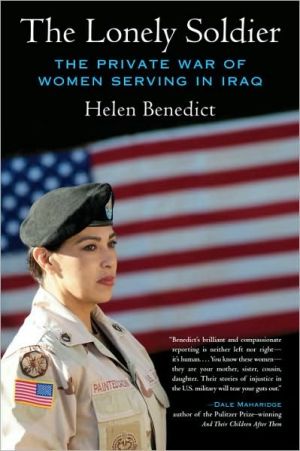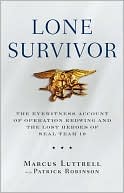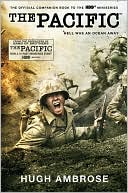The Lonely Soldier: The Private War of Women Serving in Iraq
The Lonely Solider vividly tells the stories of several military women who served in Iraq-and of the challenges they faced from warfare, discrimination, and their own consciences. A heartbreaking picture of the sacrifices women soldiers are making for this country, The Lonely Solider has already spurred reform in the military's handling of sexual assault and the rights of women soldiers.
Search in google:
More women soldiers are fighting in Iraq than in any other American war in history, yet they face a dual challenge: they are participating in combat more than ever before, but because only one in ten soldiers is female, they are often painfully alone. This isolation, along with a military culture hostile to women, denies them the camaraderie soldiers depend on for survival and subjects them to sexual persecution by their comrades. As one soldier said, “I ended up waging my own war against an enemy dressed in the same uniform as mine.”In The Lonely Soldier, Benedict humanizes the complex issues of war, misogyny, class, race, homophobia, post-traumatic stress disorder, and more through the compelling stories of five women of diverse ethnicities and backgrounds who served in Iraq between 2003 and 2006. By following these women from their childhoods through enlistment, training, active duty in Iraq, and home again, Benedict vividly brings to life their struggles and challenges. Between their stories she weaves in accounts from numerous other Iraq War veterans, illuminating the wrenching and private war of female soldiers.Benedict ends by showing how these women came to face the truth of war and by offering suggestions for how the military can improve—including distributing women more evenly and rejecting male recruits with records of domestic or sexual violence. The American Prospect When the sexual assault rates among female veterans are so astronomically high -- at least 30, and as high as 70 percent, according to Helen Benedict, author of the new book The Lonely Soldier -- the "combat" classification becomes a moot point. Keep in mind that sexual assault is a hugely underreported crime; even the Pentagon admits that only 10 to 20 percent of cases are probably being reported.
THE LONELY SOLDIER\ The Private War of Women Serving in Iraq \ \ By HELEN BENEDICT \ BEACON PRESS\ Copyright © 2009 Helen Benedict\ All right reserved.\ ISBN: 978-0-8070-6147-3 \ \ \ Chapter One\ From Girl to Soldier Life before the Military \ MICKIELA MONTOYA\ Mickiela curled up on her grandmother's couch, tucked her feet under her, and stroked her belly. Her long red hair was pulled into a high ponytail and her pretty freckled face was free of makeup. She was twenty-one, a year out of her tour in Iraq, and pregnant.\ She was staying with her grandmother in California because she needed looking after. The day before she had been rushed to an emergency room with premature contractions and kept there overnight. Her grandmother didn't want her going anywhere until they knew what was wrong.\ "She's so strict!" Mickiela whispered. "She won't even let me walk."\ Mickiela was the first female Iraq War veteran I met, and when I found her she was living in New Jersey, working and going to school. Once she discovered she was pregnant, though, she moved back home to Rosemead, which is in East Los Angeles, and had been shuttling between relatives ever since. She seemed unconcerned. She had been bounced around like that all her life.\ When I visited her in California, I discovered her grandmother's apartment complex nestled within a carefully tended garden shaded by eucalyptustrees. I climbed an outside staircase to her door and knocked, waking Mickiela from a nap. She greeted me in loose gray sweatpants and a skimpy green halter top that showed the modest slope of her belly. Her face looked a little puffy, although as freckly and fresh as all the other times I'd seen her. When I'd first met her three months earlier, I'd thought she looked achingly young for a war veteran, her wide brown eyes as clear as a child's. There, flushed with pregnancy, she looked younger than ever.\ She led me into a dark room decorated in brown, and we sat on a long chocolate-colored couch. It was early January. 2007, so Christmas decorations still hung about the room. As she nestled into some cushions, her grandmother and two of her many aunts busied themselves in the kitchen behind us.\ Mickiela is strikingly self-possessed for her age. She shifts every, now and then as she talks, but is never fidgety. Her laugh is full-throated and her smile bunches up her cheeks merrily. She always seems on the verge of a chuckle.\ "This place is really nice," I said.\ "No, it's not," she replied quickly, pulling a face. "Hey Gramma, she thinks this place is nice." Mickiela found my comment funny because, to her, Rosemead is a dump full of bad memories.\ Rosemead is a Mexican neighborhood that looks like a typical L.A. suburb. The houses, mostly small cement cubes painted in pastels, squat in neat rows along tidy streets, their tiny front yards stamps of parched grass and cacti. The wide boulevards that crisscross the area are lined with the usual chain stores and banks, and from the tops of the hills one can see palm and eucalyptus trees stretching all the way to the mountains-at least if the smog isn't too thick. But the neighborhood is deceptive, for beyond the pretty houses and sun-blasted boulevards lie lives derailed by poverty and the woes of the unwelcome immigrant: gangs, crime, dead-end futures, and the long-reaching shadow of prison.\ Mickiela's own family is entangled in gangs. Her father and many of his relatives are in one, her cousins in another, and because the gangs are rivals it's too dangerous for her to say which they are. She herself is the product of generations of teenage mothers: her mother had her at eighteen, her grandmother gave birth to her mother at fourteen. As a result, her complicated family is full of aunts younger than their nieces and grandmothers in their forties. "I have so many grandmas you can't count!"\ Her own mother was a drug addict, so neglectful of Mickiela and her sister that Child Protective Services took them away when they were small. Her father was out of the picture, so Mickiela was raised by her maternal grandmother, her favorite, the one she calls Nana. "Me and Nana, we were the closest," she told me in her Spanish-inflected accent. "I'm Mexican but I don't look Mexican, I look white, and she was like me. She dyed her hair red, so we always looked the same. I could talk with her about anything. She always understood."\ Mickiela was happy with Nana, but when she turned twelve and her sister was thirteen, her mother demanded them back, mostly to make them look after their little brother. For the next three years the family kept moving from one home to another, the sisters sometimes staying with their mother, sometimes with other relatives. In one house, the sisters' room was a closet just big enough to hold a single bed, so they had to take turns sleeping on the floor. Mickiela's mother liked to punish her by locking her in that tiny room for days at a time, only letting her out to go to school. "I have these crazy long diaries I wrote in that room. I would write things like, 'I wanna kill myself!' Then I found out that my mom was reading my diaries, so I learned how to write in my own little language so she couldn't understand."\ When Mickiela was fifteen, her mother was evicted for not paying rent, and the family was out on the street. The sisters returned to Nana once again, but this time they only found more trouble. Nana had developed gallbladder cancer, which had metastasized. Soon she began losing weight and her red hair. Gradually, she also started losing her mind.\ Just as Mickiela was in the middle of this crisis, and at the end of her junior year in May 2002, she and all her classmates, most of whom were also Mexican, were sent to the school auditorium to take a test called the ASVAB. No school officials bothered to explain what it was, but Mickiela soon found out. It was the Armed Services Vocational Aptitude Battery test, the test you take to get into the military.\ Military recruiters were a common sight in the hallways of Rosemead High. They would set up tables covered with alluring pamphlets promising money and adventure and call out to students as they walked by. With their clean, pressed uniforms and flashy smiles they were such a seductive presence that Mickiela can't even remember the recruiters who were offering other careers.\ Since 9/11 and the start of the Afghanistan War, the military has been targeting schools like Mickiela's-schools in communities where jobs are scarce and the students are poor or the children of immigrants-and promising glamorous careers and citizenship to those who join. But by the time Mickiela was in eleventh grade, the government had given recruiters another advantage as well: the No Child Left Behind Act of 2001.\ The act stipulates that no public high school can qualify for federal money unless it gives the address and telephone number of every student to the military and allows recruiters access to the school. Any family that wants to keep its address private has to submit a form saying so, but most people don't know this. Once recruiters have this information, they court the students like basketball scouts, calling them at home, taking them out for meals, and making any promises they want. Recruiters can do this because the enlistment contract that every recruit must sign states that none of these promises have to be kept-something else most people don't know.\ The main reason the government smooths the way for recruiters like this is because after 9/11, enrollment in the military dropped drastically, especially in the army. Between 2000 and 2005, recruitment declined 20 percent among noncitizens, nearly 7 percent among Hispanics, 10 percent among whites, and 58 percent among African Americans. This made recruiters so desperate to meet military quotas that they grew reckless; the army reported a 60 percent rise in "inappropriate actions" by recruiters between 1999 and 2005. They were helping high school students forge diplomas and cheat on drug tests, threatening to arrest students if they didn't sign up, and lying. In 2006, two news stations equipped students with hidden cameras and sent them to recruiting offices. "Nobody is going over to Iraq anymore?" one student asked a recruiter. "No, we're bringing people back," he replied. Another was filmed saying, "We're not at war. War ended a long time ago."\ Mickiela's recruiter was a white man in his mid-thirties who was married with children. He would drive up to the school in a new car, blasting hip-hop out of the window, and take her out for nice lunches. "He said that if I signed up with the National Guard I wouldn't have to serve outside the country. National-that means in the country, right?" He told her the army would give her $3,000 just for enlisting, pay for college, train her in the job of her choice, and enable her to travel abroad, all of which sounded dazzling to the sixteen-year-old. But what actually happened was that the $3,000 came in increments over the next four years and was taxed, she never got any money toward college, she was trained in the one job she asked not to do, and she didn't get to travel anywhere abroad-except to the war in Iraq.\ Mickiela said the recruiter was "really, really flirty," too, and when she introduced him to a seventeen-year-old friend who was also interested in enlisting, he began dating her. "I don't know if they ever had sex, but I know when they were supposed to go out on a date, he would just drive off to some place and make her give him head and that was it. She told me about it later." Mickiela pulled a disgusted face.\ In 2005 a press investigation found that over a hundred young women were sexually exploited like this by at least eighty recruiters from the army, marines, navy, and air force. Some were raped in recruiting offices, some assaulted in government cars as they were driven to military test sites, and others intimidated into sexual relationships, like Mickiela's friend. Recruiters have a power that makes teenagers afraid to reject them or report their assaults, for they control whether the teen will get into the military at all, which for someone who can see no other way out of a dead-end life is power indeed.\ In spite of her recruiter's pressure, Micklela resisted the military at first. The only part of the life that appealed to her was the physical challenge, for she had always been athletic. But when she went to her career counselor to discuss alternatives, all he said was, "When you're seventeen you'll be old enough to sign up."\ Then Nana grew worse. She became addicted to morphine and turned delusional, accusing her family of trying to poison her, and she was wasting away in front of their eyes. Mickiela couldn't bear it. In an effort to numb herself, she took to ditching school and partying all the time. She joined a graffiti crew and got kicked out of one school, then another. "My boyfriend lived right opposite my school, so I'd go see him instead of going to classes. I was smoking a lot of weed. I was really messing up."\ And then, on June 24, 2002, the day before Mickiela's seventeenth birthday, Nana died. She was fifty-two.\ "I knew she was sick, but you never actually expect it," Mickiela said quietly from her other grandmother's couch, pulling a cushion over her belly. "If I cried when I was little, Nana would always say, 'Save your tears for when I die.' But she could say that 'cause death was such a distant thing, you know?"\ After Nana's death, Mickiela was left alone with her stepgrandfather, who made it clear right away that he couldn't cope with raising her on his own. "He made me feel like he wasn't my grandpa anymore. I felt so vulnerable. I didn't know what to do."\ For a time she continued to slide downhill. Nana had always been the one to get her to school, make her do her homework, keep her organized. With no one to look out for her, Mickiela didn't care anymore. But after a summer of partying, she grew disgusted with herself. Not knowing where else to turn, she went back to the recruiter. "I wanted to do something to be proud of. I imagined telling my grandchildren one day that I'd done something to protect the country." After all, it was September 24, 2002, by then, a year after 9/11.\ The recruiter was delighted. He told Mickiela that all she needed was her mother's signature because recruits under eighteen cannot enlist without signed permission from a parent. Mickiela hadn't seen her mother in months by then, but she called her anyway and explained. "If you wanna join, forge my name, I don't care," her mother said, and hung up.\ Mickiela forged her mom's name right under the recruiter's nose. "We do this all the time," he told her. "Don't worry about it."\ So, at the beginning of twelfth grade and exactly three months after Nana died, Mickiela signed up with the California National Guard for what her recruiter told her would be six years. In fact, anyone joining any branch of the military for the first time is committed for eight years, or longer, if the military wants. But Mickiela didn't know that yet, just as she didn't know the country had been at war with Afghanistan since October 2001 because she never watched the news. Nor did she know the National Guard could send her to war whenever it needed to. She still thought she would be fighting forest fires, helping with floods, and protecting her country from terrorist attacks, all at home in California.\ By the time Mickiela graduated from high school in June 2003, the United States had invaded Iraq, and National Guard members were being turned into combat soldiers for the first time since the Korean War.\ ELI PAINTEDCROW\ Eli (who pronounces her name Elly) was forty-six when I met her, had been home from Iraq for three and a half years, and was retired from a twenty-two-year career in the army. She is fully Native American, Mexica-Apache on her mother's side, Yaqui on her father's, and her bearing reveals her pride in this. She looks statuesque, although she is only five feet three, for her back is straight and her shoulders square. She also has the patient manner of someone who has seen a lot of life and listened to a lot of people. She calls the women she likes "sister" and had spent most of her civilian years helping others as a social worker and by conducting Native American healing ceremonies. Yet as mellifluous as her voice is and as gentle her movements, she has a quality both stern and fierce. "You don't mess with Sergeant PaintedCrow," as she likes to say.\ Her fierceness is well earned, for she has endured a life of Faulknerian hardship. In no way does she seem beaten down by this, but she does seem weary. She can sound as tough as a street fighter when she talks about injustice, but certain subjects will make her slump in her chair and drop her voice to heart-wrenching tones. Sometimes her memories drive her out to her garden for a cigarette, where she stands blowing the smoke into the sky, her face raised and still as if listening to a whisper.\ Like Mickiela, Eli lives in California, only further north, in Merced, a place of empty skies, golden hills, and almost no trees. The house she was living in when I visited her was her own, which she said sometimes felt like a ball and chain and other times like a welcome cave. It was a modest, one-story building of beige stucco in a row of similar houses that resembled the adobe dwellings of a pueblo. A small porch overlooked a front yard of yellowing grass and a flowerbed full of cacti as tall as a man.\ Inside, her house was indeed cavelike, its walls painted in rich earth colors-umber, brown, rust-save for the kitchen, which was all a cheerful bright red, including the toaster and kettle. The rest of the dark house was also spotted with color: the bright blankets she'd bought in Iraq and spread over her furniture; the Native art on her walls; and the blanket draped over her ceremonial drum, which stood in a corner. Two large paintings on black velvet, given to her by Iraqi artists, hung in her little dining room. One was of a Native American woman dancing; the artist copied the image off a Hallmark card. The other depicted a veiled Iraqi girl with huge black eyes lined in kohl.\ Eli had also ringed her dark eyes in black on the day I visited her, which made them look striking and intense. She was wearing a long green skirt, brown boots, and a sage-colored sweater. Her black hair was cropped short, framing her round, high-cheeked face; and her lips were bold with deep red lipstick. She wore dangling silver earrings and silver rings and bracelets on both hands.\ (Continues...)\ \ \ \ \ Excerpted from THE LONELY SOLDIER by HELEN BENEDICT Copyright © 2009 by Helen Benedict. Excerpted by permission.\ All rights reserved. No part of this excerpt may be reproduced or reprinted without permission in writing from the publisher.\ Excerpts are provided by Dial-A-Book Inc. solely for the personal use of visitors to this web site. \ \
1 The Lonely Soldier 1Part 1 Before2 From Girl to Soldier: Life before the Military 133 They Break You Down, Then Build You Back Up Mickiela Montoya 374 They Told Us We Were Going to Be Peacekeepers Jennifer Spranger 575 The Assault Was Just One Bad Person, but It Was a Turning Point for Me Abbie Pickett 656 These Morons Are Going to Get Us Killed Terris Dewalt-Johnson 737 This War Is Full of Crazy People Eli PaintedCrow 79Part 2 War8 It's Pretty Much Just You and Your Rifle Jennifer Spranger 939 You're Just Lying There Waiting to See Who's Going to Die Abbie Pickett 12310 You Become Hollow, Like a Robot Eli Painted Crow 14911 I Wasn't Carrying the Knife For the Enemy, I Was Carrying It for the Guys on My Own Side Mickiela Montoya 16312 Mommy, Love You. Hope You Don't Get Killed in Iraq Terris Dewalt-Johnson 177Part 3 After13 Coming Home 19714 Fixing the Future 223Appendix A Military Ranks and Organization 233Appendix B Where to Find Help 235Acknowledgments 237Notes 239Index 256
\ The American ProspectWhen the sexual assault rates among female veterans are so astronomically high -- at least 30, and as high as 70 percent, according to Helen Benedict, author of the new book The Lonely Soldier -- the "combat" classification becomes a moot point. Keep in mind that sexual assault is a hugely underreported crime; even the Pentagon admits that only 10 to 20 percent of cases are probably being reported.\ \ \ \ \ ForeWord"Benedict's book, filled with compelling and heartbreaking stories, is a groundbreaking testament to the bravery, resilience, and almost insurmountable obstacles faced by women in stationed in Iraq.\ \ \ Ms.. . . The Lonely Soldier has strong merit as an account of women's military experience in this long and reckless war.\ \ \ \ \ Women's e-NewsDomestic violence among veterans has reached historic frequency," Helen Benedict writes in her new book "The Lonely Soldier: The Private War of Women Serving in Iraq." "And post-traumatic stress disorder rates appear to be higher among Iraq war veterans than among those who have served in Afghanistan or even, many believe, in Vietnam. One of the symptoms of this disorder is uncontrollable violence.\ \ \ \ \ Library JournalIn Iraq more women soldiers have been in harm's way than ever before, making a mockery of the official policy barring women from combat. These women face special challenges, such as isolation, sexual predation, misogyny, to say nothing of firefights, Improvised Explosive Devices, and post-traumatic stress disorder. Benedict (journalism, Columbia Univ.) displays some hostility to the military generally but does provide an anodyne to the favorable chronicles that write only of heroism. She also offers recommendations for change.\ \ —Edwin B. Burgess\ \








